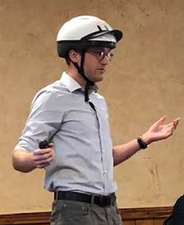Work in ProgressBayesians Commit the Gambler's Fallacy . (Mathematica Notebook) The Conjunction Fallacy: Confirmation or Relevance? (with WooJin Chung, Matthew Mandelkern, and Salvador Mascarenhas) Academic Publications
Rational Polarization.
2023. The Philosophical Review 132 (3): 355-458
Being Rational and Being Wrong. 2023. Philosophers' Imprint 23 (3): 1-25
Splitting the (In)Difference: Why Fine-Tuning Supports Design (with Chris Dorst). 2022. Thought 11 (1): 14-23. (Almost) All Evidence is Higher-Order Evidence (with Brian Hedden). 2022. Analysis 82 (3): 417-425. Assertion is Weak (with Matt Mandelkern). 2022. Philosophers' Imprint 22 (19): 1-20. Good Guesses (with Matt Mandelkern). 2022. Philosophy and Phenomenological Research 105 (3): 581-618 Be modest: you're living on the edge. 2022. Analysis. 81 (4): 611–621. Deference Done Better (with Ben Levinstein, Bernhard Salow, Brooke E. Husic, and Branden Fitelson ). 2021. Philosophical Perspectives. 35 (1): 99–150. [Mathematica notebook] Evidence: A Guide for the Uncertain. 2020. Philosophy and Phenomenological Research. 100 (3): 586–632. Abominable KK Failures. 2019. Mind. 128 (512): 1227–1259 Lockeans Maximize Expected Accuracy. 2019. Mind. 128 (509): 175–211 Higher-Order Uncertainty. 2019. In M. Skipper & A. Steglich-Petersen (eds.), Higher-Order Evidence: New Essays. Oxford University Press, 35–61. Can the Knowledge Norm Co-Opt the Opt-Out? 2014. Thought: A Journal of Philosophy 3 (4): 273–282. Handbook Articles and ReviewsHigher-Order Evidence. Forthcoming. In Maria Lasonen-Aarnio and Clayton Littlejohn (eds.), The Routledge Handbook for the Philosophy of Evidence. Routledge. Review of Epistemic Consequentialism , by Kristoffer Ahlstrom-Vij and Jeffrey Dunn (eds.). 2020. Philosophical Review 129 (3): 484-489. Dissertation: Modest EpistemologyThinking properly is hard. Sometimes I mess it up. I definitely messed it up yesterday. I’ll likely mess it up tomorrow. Maybe I’m messing it up right now.
I’m guessing you’re like me. If so, then we’re both modest: we’re unsure whether we’re thinking rationally. And, it seems, we should be: given our knowledge of our own limitations, it’s rational for us to be unsure whether we’re thinking rationally. How, then, should we think? How does uncertainty about what it’s rational to think affect what it’s rational to think? And how do our judgments of people’s (ir)rationality change once we realize that it can be rational to be modest? My dissertation makes a start on answering those questions. |
